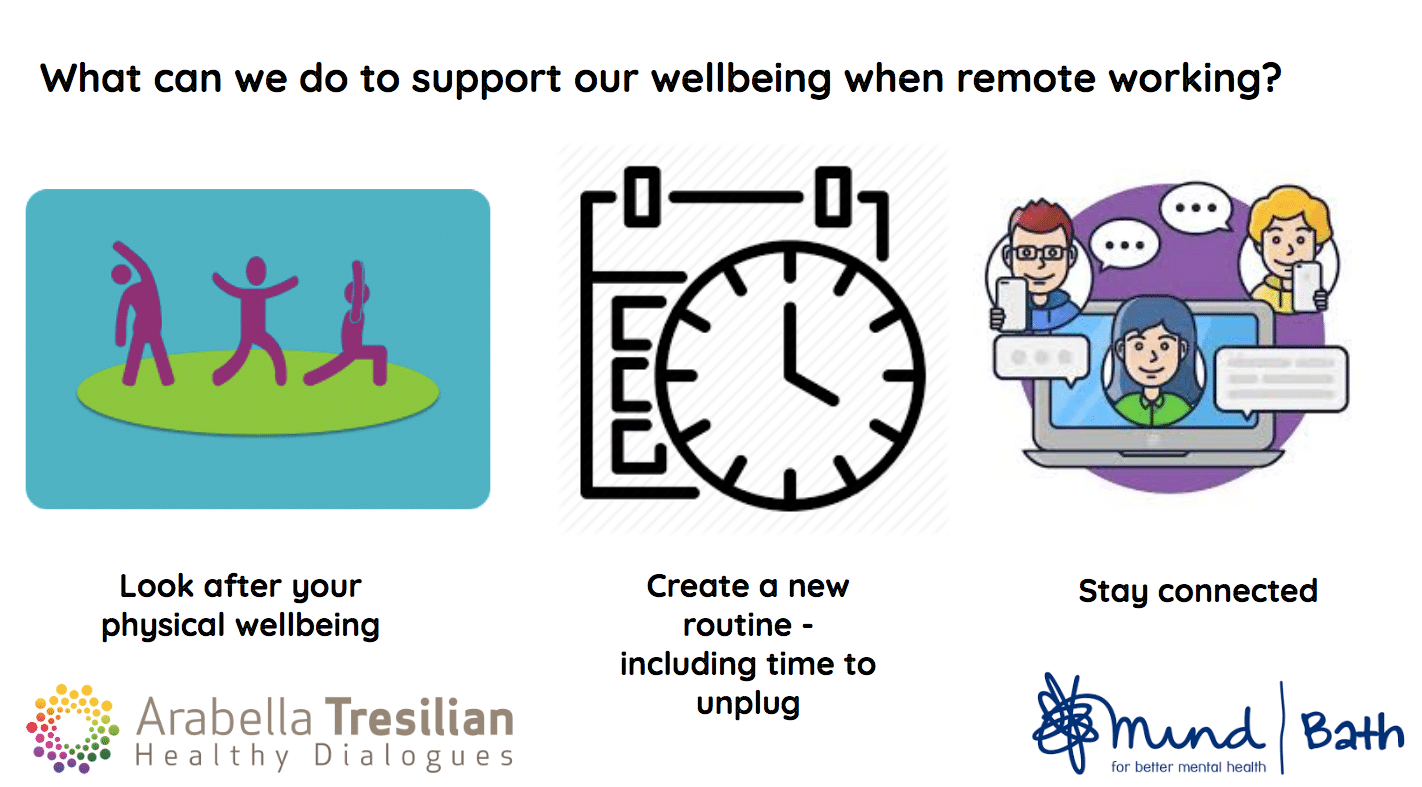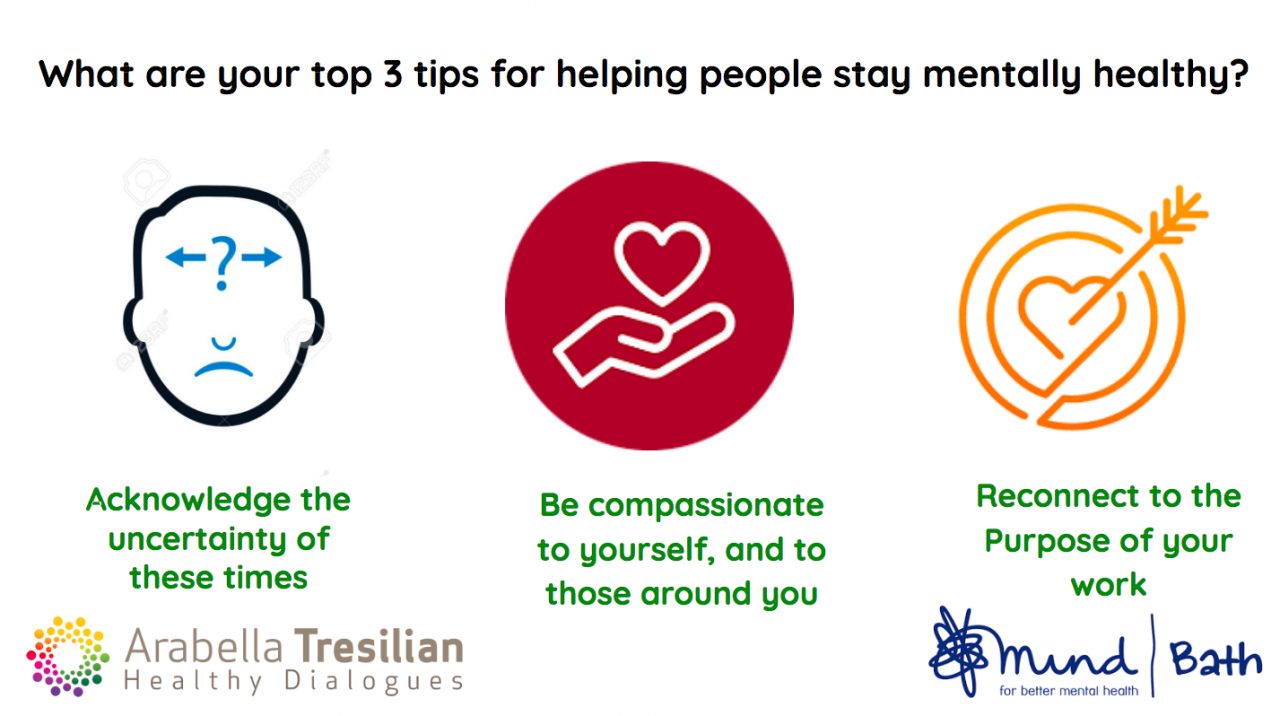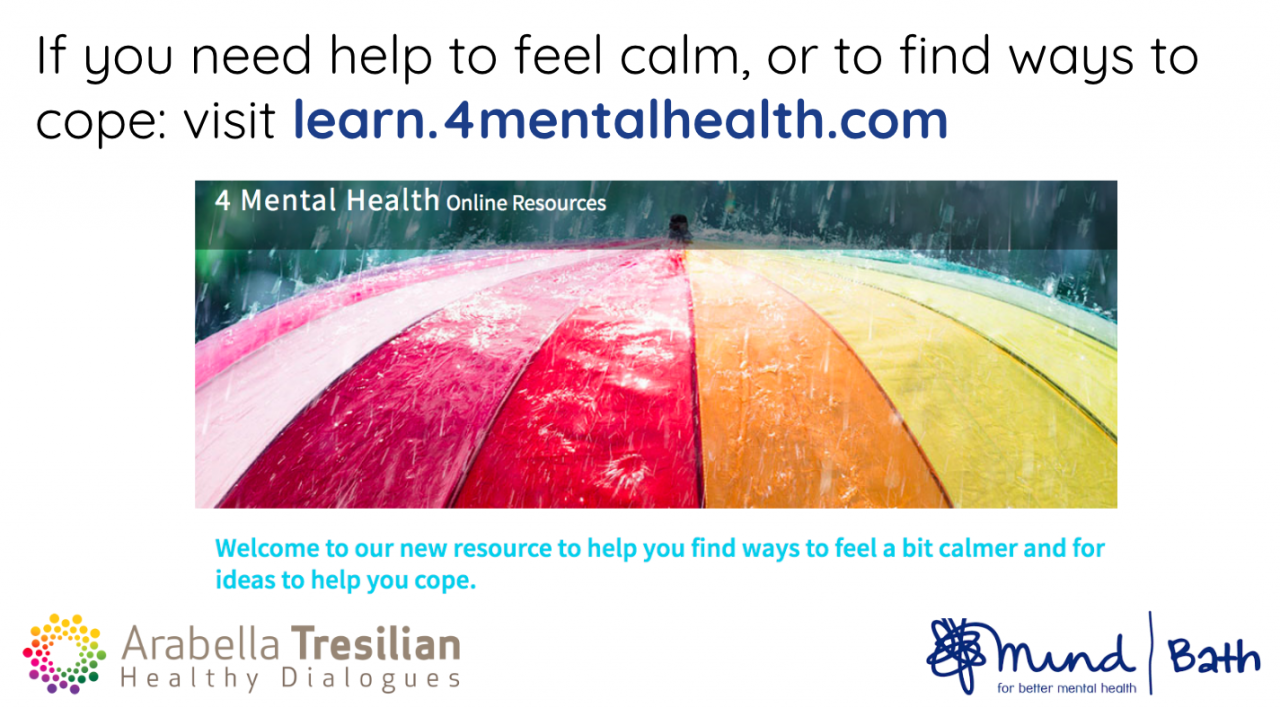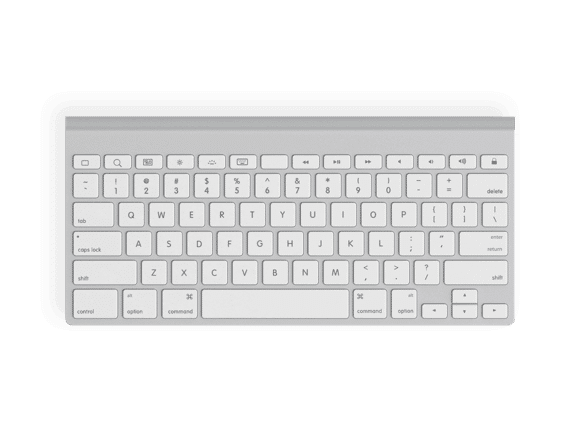This week, I was asked to contribute to a Q&A video on how to maintain mental wellbeing while remote working during the coronavirus quarantine period, by colleagues at Royds Withy King LLP and Bath Mind. Here I share the questions put to me by Royds Withy King’s Director of HR, and my researched notes for the video we made together (being edited now).
I hope these tips and online resources are helpful for you, your colleagues and your loved ones – whether remote working or not – in keeping mentally and emotionally healthy under the challenging and distressing conditions we find ourselves in at the moment. Even if we are not serving out there on the frontline as essential workers at this time, we have a role to play in the work we do from home. It’s important to treat ourselves with compassion and care, and even more so if we have other caring responsibilities or loved ones at risk.
1) What signs should we look out for in ourselves or others that may give cause for concern during the Coronavirus pandemic?
There is a valuable phrase doing the rounds online:
"You are not working from home; you are at your home during a crisis trying to work."
I've heard this twice today. I think it's an important distinction worth emphasising.
— Neil Webb (@neilmwebb) March 31, 2020
You are not working from home; you are at home, during a crisis, trying to work.
We can ask ourselves:
- Am I expecting to be just as productive as if I were ‘working from home’ or working from the office in normal conditions?
- Am I trying to compensate for lost productivity by working longer hours?
- Am I prioritising work over our personal, mental and emotional health?
- Am I letting work concerns to stop me from attending to the needs of my household and any vulnerable relatives?
- Am I experiencing feelings of low mood, unusual frustration or overwhelming anxiety?
If you can answer if yes to any of these questions, it might be time to take affirmative action for yourself – even if traditionally you haven’t ‘needed’ to do any thing new or different to support your wellbeing. And that means looking at the advice out there and implementing some new health-giving steps.
2) What can we do to support ourselves while remote working?
- Look after your physical self – “Eat well and stay hydrated. Think about your diet. Your appetite might change if your routine changes, or if you’re less active than you usually are. Eating regularly and keeping your blood sugar stable can help your mood and energy levels.” Make sure you take your daily exercise – out of the house if possible.
- “Routine: can you create a routine or timetable for yourself? And if you live with other people, should you create a household schedule? Do you need to agree how the household will run with everyone at home all day?” And is self-care built in to that routine?
- “Connectivity: have you got ways to keep in contact with people you see regularly, like their phone numbers, email addresses? Do you need help setting up digital communication, like a video calling app?”
Source: (Mind)
3) What can we do to support others while remote working?
As a workplace mediator, I know the importance of clear and compassionate communication at the best of times. Being gentle with one another is more valuable than ever at this time.
Mental Health at Work suggests 3 issues that can arise which might impact the mental health of employees working remotely include:
- Loneliness and a lack of collaboration and communication with others
- Being unable to set healthy boundaries between work and personal time and being unable to ‘unplug’
- Lack of motivation
My suggested solutions would include:
- Loneliness and a lack of collaboration and communication with others:
- Check in with each other first on wellbeing – people are affected differently depending on what’s going on for them at home. Find out how each person is.
- Be really explicit about communication regarding collaboration – shared Google docs, or your equivalent, can be great for project management, and remove endless email exchanges. As a workplace mediator I understand how vital clear comms are.
- Being unable to set healthy boundaries between work and personal time and being unable to ‘unplug’:
- Role model good work/home boundaries to each other – put “Going out for a walk” into your shared calendar
- Ask others what they are doing to unplug and maintain boundaries
- Be aware that people with caring responsibilities may be fitting hours in where they can – acknowledge that appreciatively
- Lack of motivation
- Never has been praise and appreciation been more important! Cheer each other on for the slightest achievement. Note even the small stuff.
4) What are your top 3 tips for helping people stay mentally healthy while remote working?
- Acknowledge the uncertainty of the times we are living in – and talk about it: “Uncertainty causes extra stress and anxiety,” says Rosie Weatherley, information manager at mental health charity Mind, “so it’s entirely understandable if you’re struggling to deal with the unknown.The simple act of recognising that none of us are alone in this situation may make uncertainty less intimidating. Making big and sudden adjustments to the way we live our lives is unsettling, but there is some comfort and reassurance to be gained from the fact we’re all in this together.” (HuffPost)
- Be compassionate to yourself, and to those around you: “Self-compassion boosts the immune system, it reduces anxiety, and it’s the easiest way to keep our hearts open to others. Some measure of fear is a healthy response to a contagious virus, of course. We want to respond to the contagion in a wise manner – with preventive measures that benefit ourselves and others.” Dr Chris Germer and Dr Kristin Neff, Centre for Mindful Self-Compassion
- Reconnect to the ‘purpose’ of your work. When it’s a time of emergency and we’re working from our homes, and we see essential workers at the front line, we can feel disconnected. But remember, your work has purpose too. We all have a role to play. Huffington Post shares how James Pacey, co-founder of Haptivate, suggests you grab and piece of paper and ask yourself these 5 questions:
-
- How does your job help you to look after the people and things you care about in life?
- What relationships at work are important to you? How do these people rely on you and what would be the impact on them if you weren’t there for them?
- How does your work help your customers or clients?
- How is your work helping you develop as a person?
- What other impacts does your work have on others?
5) What resources are out there for further help and support while remote working?
There are fantastic resources out there – and I think if we can implement some of the healthy-giving advice now, it will actually improve our working habits for the future, for the good of our physical and mental health.
Three top sites would be for supporting your mental health during coronavirus would be:
- Mind and local Mind branches like Bath Mind
- Mental Health at Work
- NHS One You
- 4 Mental Health Online Resources
Here are further links to other specific areas of interest related to remote working:
How to look after your mental health during the Coronavirus outbreak (Mental Health Foundation)
Coronavirus and your wellbeing (Mind)
4 Mental Health Online Resources
Coronavirus: How to protect your mental health (BBC)
If you’re worried about your mental health during the coronavirus outbreak (Samaritans)
Supporting colleagues to stay mentally healthy in unusual working conditions (Mental Health at Work)
10 tips to help if you are worried about coronavirus (NHS)
Mental wellbeing while staying at home (NHS)
Zero Motivation To Work From Home? Here’s How To Get Your Mojo Back | HuffPost Life
Uncertainty Is A Hard Feeling To Sit With. Here’s How To Lighten The Load (HuffPost)
Urgent mental health support (NHS)
And finally, for some light relief: here’s me remote working as I record the video in my pop-up film studio at home. Full credit to the clothes horse!

Remote working: home film studio










